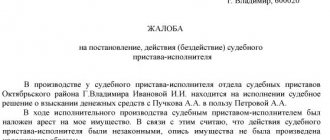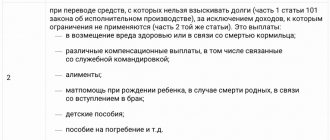Searching for the debtor's property in enforcement proceedings is a very effective way to identify the material assets of the defaulter and repay the existing debt. What this procedure is and how it is carried out will be discussed today.
Search for the debtor's property is a set of measures carried out by an official to locate and identify the debtor's property. In practice, these measures are often identified with a request for all necessary information about the financial situation of the defaulter.
As part of the search for the debtor's property, the following information is analyzed, collected and provided to the collector:
- about the debtor’s possession of a vehicle and its model;
- about the debtor’s real estate, its type, address and number of objects;
- about the debtor’s bank accounts, the name of the bank and the amount of funds;
- about the debtor’s ownership of shares, shares of various companies and the status of the owner of the enterprise.
Thus, putting a person on the wanted list can be called forcing the debtor to fulfill the requirements.
Actions to search for the debtor's property can be carried out by a bailiff personally (without outside assistance) or with the involvement of internal affairs bodies. The basis for starting the search is a resolution approved by the senior bailiff.
Important:
After announcing a search, the bailiff has the right to request operational reference and search information from data banks. In addition, the bailiff has the right to process all personal data, which may contain the information he needs.
The implementation of the approved procedures is related to the procedure for carrying out the actions of bailiffs in relation to the debtor and his property and consists of:
- organizing and carrying out search activities;
- ensuring the costs of carrying out the investigation;
- conducting search cases;
- exercising control functions over the implementation of powers in the search process;
- appealing against actions or inaction of officials during the implementation of the state search function.
Important:
At the legislative level, the responsibility of officials participating in the performance of the state search function is determined.
Reasons
The official has the right to announce a search for the property of the defaulter if there is no information about its location.
The search procedure can be started either on the executor’s own initiative or on the basis of a written request from the claimant. The main condition is that the amount of debt must be over 10 thousand rubles.
The basis for declaring a wanted person is a resolution approved by the senior bailiff.
The search for the property of the defaulter can be announced at the following places:
- stay of the debtor;
- residence of the debtor;
- location of the debtor's property;
- residence of the claimant.
Procedure
According to current legislation, the bailiff is obliged, within three days from the receipt of the claimant’s application or the discovery of grounds for starting a search, to issue a resolution to search for the debtor’s property. This document must contain clear instructions on enforcement actions. That is why measures to enforce the requirements of the executive document are carried out on the basis of the issued resolution.
Important:
The search order must be approved either by the senior bailiff himself or his deputy, after which the document is subject to immediate execution.
Each of the parties to the enforcement proceedings must receive a copy of the resolution to begin the search for property or to refuse to conduct it. If there is no reliable information about the whereabouts of the debtor, a copy of the document is sent to the last known address.
Required documents
To begin enforcement proceedings on the search, the following documents are required:
- a copy of the resolution on enforcement proceedings;
- resolution and its copy on the establishment of a search case;
- inventory of documents of the search case;
- copy of the writ of execution;
- a copy of the claimant's application for the search;
- certificates prepared by a bailiff and reflecting information: on the execution of actions to establish the location of the debtor’s property;
- about the impossibility of establishing the location of property without investigative measures;
- on the plan of activities related to the search for property;
- on the results of individual search activities;
- information from government agencies about the debtor’s property status.
Search case for enforcement proceedings
In accordance with Russian legislation, a search case must be opened no later than the day following the date of the decision to open a search case.
The following can become familiar with the case materials:
- head and deputy head of the territorial division of the FSSP;
- senior bailiff of the department in which this search case was opened;
- persons carrying out inspections of the activities of a structural unit in the direction of the search.
The bailiff responsible for the execution of the proceedings or the claimant must be provided with a certificate of the results of the search no later than the day following the day of receipt of the bailiff's request or the claimant's application. The completed search case is submitted to the archives in accordance with the requirements of the FSSP Office Management Instructions. The storage period for discontinued search cases is five years.
Procedure for discovering the debtor's property
When the debtor's property is discovered, the bailiff carries out enforcement actions and measures to enforce the requirements of the writ of execution at the place where the property was discovered. If necessary, the debtor is transferred to the place closest to the FSSP unit for the purpose of applying enforcement measures or taking enforcement actions. After the necessary actions are completed by the bailiff who carried out the search, the decisions (acts) are transferred to the bailiff who initiated the search activities.
The termination of the search for the debtor's property is carried out on the basis of the issuance of a corresponding resolution by the bailiff associated with the case.
The grounds for terminating search proceedings are:
- establishing the location of property;
- implementation of the search action plan;
- refusal of the claimant to carry out collection activities.
Important:
The decision to terminate the search becomes legally binding after the document is approved by the senior bailiff.
Application to search for the debtor's property: sample
The claimant may initiate a search for the debtor's property independently. To do this, he needs to submit a corresponding application to the bailiff.
Thus, searching for the debtor’s property allows not only to identify the true financial situation of the defaulter, but also to repay the existing debt in a short time.
The bailiff is carrying out enforcement proceedings to collect money from the debtor. The location of the debtor is unknown. Can the bailiff put him on the wanted list?
- Question: No. 1713 dated: 2015-03-26.
On the merits of the question asked, we report the following.
In accordance with Part 1 of Article 65 of Federal Law No. 229-FZ of October 2, 2007 “On Enforcement Proceedings” (hereinafter referred to as the Law on Enforcement Proceedings), the bailiff, during enforcement proceedings, announces an executive search for the debtor and his property.
According to Part 2 of Art. 65 of the Law on Enforcement Proceedings, the search is announced at the place of execution of the enforcement document or at the last known place of residence or place of stay of the debtor, the location of the debtor’s property or the place of residence of the claimant. Declaring a search is the basis for carrying out such a search on the territory of the Russian Federation, as well as in the manner established by international treaties of the Russian Federation on the territories of foreign states.
The order to search for the debtor or his property is issued by the bailiff within three days from the date of receipt of the claimant's application to announce the search or from the date the grounds for declaring the search arise and is approved by the senior bailiff or his deputy.
In accordance with Part 8 of Art. 65 of the Law on Enforcement Proceedings, the search warrant is subject to immediate execution. This resolution entrusts the search process to the bailiff carrying out the search, or to the bailiff in charge of the relevant enforcement proceedings and who in this case exercises all the powers of the bailiff carrying out the search.
Copies of the bailiff's decision on the search are sent to the parties to the enforcement proceedings no later than the day following the day of its issuance. If there is no information about the whereabouts of the debtor, a copy of the order of the bailiff is sent to the last known place of residence or place of stay of the debtor.
Within the meaning of Part 10 of Article 65 of the Law on Enforcement Proceedings during a search, the bailiff carrying out the search has the right to carry out enforcement actions provided for by the Law on Enforcement Proceedings, as well as carry out the following enforcement and investigative actions:
1. request operational reference and search information from data banks and process personal data necessary for the search, including information about persons and their property;
2. check the identification documents of a citizen if there are grounds to believe that he and (or) his property are wanted;
3. carry out personal identification, interview citizens, make inquiries, study documents, inspect property, inspect premises, buildings, structures, areas of the area occupied by or belonging to the wanted persons, as well as vehicles belonging to these persons.
According to Part 13 of Art. 65 of the Law on Enforcement Proceedings, when a wanted debtor-citizen is discovered, enforcement actions are carried out, and enforcement measures are applied at the place of his discovery. If necessary, to carry out enforcement actions or apply enforcement measures, the debtor-citizen may be transferred to the bailiff unit closest to the place of detection.
Thus, the current legislation on enforcement proceedings provides for a procedure for searching for the debtor.
Determining the location of the defaulter in respect of whom a court order has been issued to collect the amount of debt in favor of the plaintiff is a preparatory measure initiated during enforcement proceedings.
These actions must be carried out by bailiffs on their own initiative or upon an application from an interested person.
After the court makes a decision in favor of the plaintiff, enforcement proceedings must be initiated. For this purpose, the interested party receives a writ of execution and is sent to the FSSP office at the defendant’s registered address or the location of his property (for example, an apartment).
The writ of execution can be sent to the necessary authority by the court.
FSSP employees notify the debtor of the need to repay the obligation within 5 days from the date of receipt of the letter. After missing the deadline for voluntary payment of the debt, bailiffs have the right to resort to compulsory measures to collect finances.
To execute a court ruling that has entered into legal force, FSSP employees can use any legal measures. One of the activities is collecting information about the defaulter (about his place of registration, actual residence address, place of employment, availability of bank accounts, etc.).
Who is wanted?
The bailiff conducting enforcement proceedings has the right to announce a search. He can independently initiate the search procedure in certain cases established by law:
- the case concerns arrears of obligatory budget payments in the amount of at least 10 thousand rubles;
- proceedings were initiated in connection with the collection of alimony or compensation for damage caused.
In other cases, when it comes to property debts, in order to announce search activities, the bailiff requires a written statement from the claimant.
Harm and damage, what's the difference?
Article 16 of the Civil Code of the Russian Federation refers to the recovery of losses from officials and government bodies, and Article 1064 of the Civil Code of the Russian Federation refers to compensation for damage.
For the purposes of applying Article 1064 of the Civil Code of the Russian Federation, the Supreme Court interprets harm as a decrease in a material or intangible benefit protected by law. In turn, causing such property damage entails the obligation of the guilty party to compensate for losses (Determination of the RF Armed Forces No. 81-KG14-19 of January 27, 2015).
By virtue of clause 2 of Art. 15, art. 16 of the Civil Code of the Russian Federation, losses are the expenses that the victim is forced to bear in order to restore his violated rights, his damaged goods, as well as the death or damage to his property (real damage). In addition, losses include lost profits.
Thus, harm is a broader concept; it implies damage, a decrease in some benefits; harm can be both moral and material. And damage is a material consequence of caused property damage, expressed in the incurrence of expenses for the restoration of rights or the loss of certain property.
Moral injury
Moral damage is subject to compensation when personal non-property rights or intangible benefits are violated (Article 151 of the Civil Code). By virtue of Part 2 of Article 1099 of the Civil Code of the Russian Federation, if only property interests were damaged, then moral damage is compensated only if this is directly established by law. The Supreme Court of the Russian Federation in its Determination of March 21, 2016 No. 309-ES16-813) indicated that the executive legislation does not contain any indication of the possibility of compensation for moral damage, therefore causing material damage does not entail compensation for moral damage.
This is only possible if it can be proven that as a result of the unlawful behavior of officials, intangible benefits (life, health, business reputation, inviolability of home, freedom of movement, family secrets, etc.) were damaged.
For example, moral damages were compensated to a citizen who was unable to go on vacation abroad with his wife because the bailiff did not promptly inform the border service about the lifting of restrictions. The unlawful behavior of the bailiff encroached on the intangible benefit belonging to the plaintiff (Article 150 of the Civil Code of the Russian Federation) - freedom of movement, and the right to family vacation was also violated, in addition, the plaintiff was a consumer of tourism services (Appeal ruling of the Kostroma Regional Court dated January 14, 2021 N 33-55/2019).
There is an interesting letter from the FSSP of Russia dated December 23, 2011 No. 12/01-31392-AP , which provides an example of decisions of the Zavolzhsky District Court of Tver in case No. 2-2069/2011 and case No. 2-2070/2011. The debtor received compensation for moral damage due to the fact that during the forced eviction of himself and his minor children, the bailiff filmed a video, and subsequently the video was shown on television without the debtor’s consent.
But in another case, the plaintiff did not receive compensation for moral damage, since he did not prove that it was the bailiff’s long-term failure to comply with the court decision that led to his illness (Appeal ruling of the Kostroma Regional Court dated April 15, 2021 No. 33-641/2019).
What you need to provide
For an effective search, the applicant should include in the application the existing facts of concealment of property and a list of the debtor’s potential property. Such information will allow the bailiff to make requests to the necessary registration authorities, identify and recover hidden property. For example, the availability of information about the defendant’s car will direct the bailiff to contact the traffic police, and information about the availability of securities will direct the bailiff to contact the National Settlement Depository.
Potential property that may belong to the debtor:
- real estate and land (including abroad);
- motor transport, aircraft and sea vessels, self-propelled equipment;
- cash deposits, securities, bonds, metal and investment accounts, precious metals.
Important Preparation
Before learning how to apply to search for a person, you need to calmly prepare the necessary information that will help you quickly find the wanted person. There may be excitement at the station, making it difficult to remember important details, so it is better to write everything down at home. In addition, you can always consult with your family, who will suggest something essential.
Details that speed up and facilitate searches include:
- physical signs - scars, moles, deformities, birthmarks, etc.;
- description of appearance - height, body type, eye and hair color;
- age and gender;
- other individual characteristics that distinguish the wanted person from others (lameness, absence of limbs, etc.).
The following information will also be valuable to investigators:
- clothing – equipment, color, material, bright details;
- personal belongings that a person may have with him - often it is from them that it is possible to trace the trace of the lost person;
- contacts - friends, acquaintances, colleagues with whom the missing person was in contact.
When listing people with whom a person could communicate, you need to remember not only regular contacts and good friends, but also new acquaintances, as well as those who were aggressive towards the missing person.
Important! When contacting the police, you must have your own documents, as well as the papers of the disappeared person (passport, pension card, medical card, birth certificate, etc.).
How does the search happen?
The bailiff within 3 days considers the received petition to begin the search. Based on the results of the consideration, a resolution is issued to initiate a search or a refusal to satisfy the applicant’s demands. This resolution must be signed by the senior bailiff of the territorial division of the FSSP or his deputy. The search procedure begins immediately. The executor is appointed either a separate bailiff involved in the search, or the bailiff who conducts this enforcement proceeding.
2 months are allocated for search activities, after which the search can be extended for another 2 months by decision of the official. The grounds for terminating the search case may be one of the following reasons:
- the allotted period has expired;
- property found.
Hotline for citizen consultations: 8-804-333-70-30
Who can initiate the search?
Not only the relatives of the missing person, but also anyone who is interested in finding him has the right to start a search. These could be friends, neighbors or colleagues who noticed the long absence of an acquaintance.
First, of course, outsiders need to talk to relatives, if possible. So that it doesn’t turn out that the neighbor left to work, and at home he was put on the wanted list at the request of the overly vigilant Mary Vanna.
It is important that in many cases it is the appeal of strangers that helps save a person. Such situations arise in dysfunctional families, when alcoholic parents do not care about their own children, or when the missing person lived alone and did not maintain contact with relatives.
Important! The duty officer cannot refuse to accept an appeal because it is not being submitted by a relative.
What actions (inactions) of bailiffs can lead to compensation for harm
Harm may arise due to the failure or improper performance of their official duties by bailiffs, for example, property that cannot be seized or at a reduced price is sold.
Most often, recovery of damages from bailiffs is associated with:
- untimely lifting of restrictions on travel outside the country;
- inaction of bailiffs;
- improper storage of seized property.
Late lifting of travel restrictions
If the debtor, having paid the entire debt, bought a tourist package, a plane ticket, booked a hotel, and already at the airport he is not allowed out due to the FSSP ban, because the bailiff simply forgot to give the border guards the order to lift the restriction.
In such a situation, debtors are required to reimburse the cost of tickets, vouchers and reservations. Usually, it is not difficult to prove the connection between the unlawful behavior of the bailiff and damage in such cases (Appeal ruling of the St. Petersburg City Court in case No. 33-15629/2016; Decision of the Moskovsky District Court of Kaliningrad in case No. 2-3425/2017, Appeal ruling of the Moskovsky City Court court dated July 16, 2019 in case No. 33-23996/2019, Appeal ruling of the Kurgan Regional Court dated August 16, 2018 in case No. 33-2623/2018).
Loss of seized property
Another popular category of cases is compensation for actual damage due to loss of property or property as a result of improper storage. For example, the bailiffs took the car and transferred it to safekeeping. It was in good working order, without damage, as confirmed by the inventory and inspection card. When the auction failed, one of the creditors agreed to take the car, but saw that it was badly damaged. The cost of the necessary parts and repairs was calculated by the expert (Decision of the Leninsky District Court of Kostroma in case No. 2-1936/2017).
In another case, property was also transferred to a third party, while the bailiff did not control its safety, and it was lost. The transfer of seized property for the purpose of storing it does not entail the release of the FSSP of Russia from liability for damage due to its loss or damage (Determination of the Armed Forces of the Russian Federation dated 02/08/2021 in case No. A07-28014/2019).
The bailiff seized the mink skins from the company and transferred them to safekeeping. Subsequently, the company went bankrupt, the arrest was canceled, but when opening the container it was discovered that there were no skins. The company recovered more than 30 million rubles of damage from the treasury of the Russian Federation, since the bailiff repeatedly transferred property from one custodian to another, but did not open the container, did not count the skins, did not make an inventory (Resolution of the Arbitration Court of the North-Western District dated October 16, 2021 on case No. A21-8914/2016)
Recovery of damages caused by illegal inaction of a bailiff
The most complex cases are cases of recovery of damages caused by the illegal inaction of bailiffs.
Bailiffs themselves do not execute judicial acts, payment of sums of money, performance of certain actions is the responsibility of the debtor at his own expense, the state should not pay for the debtor if he has nothing. The task of the bailiffs is to ensure the debtor’s forced execution of the court decision. Therefore, not every failure to perform will result in damages.
If the bailiff took all the necessary actions, but the funds were never collected due to the debtor not having them, then the bailiff cannot be held responsible. He must compensate for the damage caused only when it is proven that the debtor had property to collect, and that it was due to the inaction of the bailiff that the debtor got rid of this property or money, as a result of which the collector was unable to receive anything.
At the same time, keep in mind that it is the FSSP that must prove that the possibility of execution has not been lost (Determination of the Armed Forces of the Russian Federation dated 02/05/2019 N 5-КГ18-294).
For example, by the decision of the Arbitration Court of the Omsk Region dated June 27, 2017 in case A46-1383/2017, the company’s demands for the recovery of more than 3 million rubles from the Russian Federation represented by the FSSP were satisfied. The plaintiff managed to convince the court that the inability to collect the debt from the debtor arose as a result of the bailiff’s untimely taking of the necessary measures. The bailiff did not establish the existence of the debtor's accounts in credit institutions and did not seize them. The debtor withdrew more than 5 million rubles from the account, this amount was enough to pay off all debts. The debtor was later declared bankrupt. The inaction of the bailiff led to the impossibility of collecting the full amount of the debt, the bankruptcy of the legal entity - the debtor, thereby causing damage to the property interests of the claimant.
"Burned"
If a citizen is insolvent, he can apply to the court to declare him bankrupt.
Or his creditors have the right to submit an application if the amount of debt exceeds 500 thousand rubles and there have been no payments for more than 3 months.
Unlock access to the private part of Clerk with a Premium subscription. Get hundreds of webinars and online courses, unlimited consultations and other proprietary content for accountants.
Hurry up to subscribe with a 20% discount until October 15, 2021. Read more about “Premium” here.
"Not all at once"
If there is nothing to take from the debtor other than salary or pension, the bailiff imposes a monthly deduction from income towards the debt.
By law, you cannot withhold more than 50%, and only for debts for alimony or compensation for harm to life or health, the permissible percentage of withholding increases to 70%.
Therefore, it is impossible to collect other debts from a debtor who has already had the maximum percentage deducted from his earnings or pension (unless it is a mortgage - then the apartment is sold).
For example: the debtor is deducted 70% from his salary to pay child support. Until this debt is closed (and this, as a rule, is not soon - until the child turns 18), the rest of his creditors will have to wait their turn.









